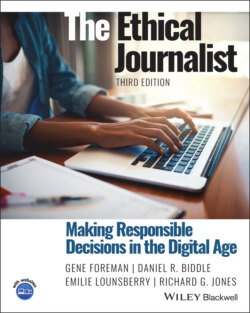Читать книгу The Ethical Journalist - Gene Foreman - Страница 28
Point of View A ‘Tribal Ferocity’ Enforces the Code
ОглавлениеThe looseness of the journalistic life, the seeming laxity of the newsroom, is an illusion.
By John Carroll
This essay is excerpted from the Ruhl Lecture on Ethics delivered at the University of Oregon on May 6, 2004. John Carroll was then the editor of the Los Angeles Times.
ONE REASON I was drawn to my chosen career is its informality, in contrast to the real professions. Unlike doctors, lawyers, or even jockeys, journalists have no entrance exams, no licenses, no governing board to pass solemn judgment when they transgress. Indeed, it is the constitutional right of every citizen, no matter how ignorant or how depraved, to be a journalist. This wild liberty, this official laxity, is one of journalism’s appeals.
I was always taken, too, by the kinds of people who practiced journalism. My father, Wallace Carroll, was editor and publisher of a regional newspaper, in Winston‐Salem, North Carolina. The people he worked with seemed more vital and engaged than your normal run of adults. They talked animatedly about things they were learning – things that were important, things that were absurd. They told hilarious jokes. I understood little about the work they did, except that it entailed typing, but I felt I’d like to hang around with such people when I grew up. Much later, after I’d been a journalist for years, I became aware of an utterance by Walter Lippmann that captured something I especially liked about life in the newsroom. “Journalism,” he declared, “is the last refuge of the vaguely talented.”
Here is something else I’ve come to realize: The looseness of the journalistic life, the seeming laxity of the newsroom, is an illusion. Yes, there’s informality and humor, but beneath the surface lies something deadly serious. It is a code. Sometimes the code is not even written down, but it is deeply believed in. And, when violated, it is enforced with tribal ferocity.
Consider, for example, the recent events at The New York Times.
Before it was discovered that the young reporter Jayson Blair had fabricated several dozen stories, the news staff of The Times was already unhappy. Many members felt aggrieved at what they considered a high‐handed style of editing. I know this because some were applying to me for jobs at the Los Angeles Times. But until Jayson Blair came along, the rumble of discontent remained just that, a low rumble.
When the staff learned that the paper had repeatedly misled its readers, the rumble became something more formidable: an insurrection. The aggrieved party was no longer merely the staff. It was the reader, and that meant the difference between a misdemeanor and a felony. Because the reader had been betrayed, the discontent acquired a moral force so great that it could only be answered by the dismissal of the ranking editors. The Blair scandal was a terrible event, but it also said something very positive about The Times, for it demonstrated beyond question the staff’s commitment to the reader.
Several years ago, at the Los Angeles Times, we too had an insurrection. To outsiders the issue seemed arcane, but to the staff it was starkly obvious. The paper had published a fat edition of its Sunday magazine devoted to the opening of the city’s new sports and entertainment arena, called the Staples Center. Unknown to its readers – and to the newsroom staff – the paper had formed a secret partnership with Staples. The agreement was as follows: The newspaper would publish a special edition of the Sunday magazine; the developer would help the newspaper sell ads in it; and the two would split the proceeds. Thus was the independence of the newspaper compromised – and the reader betrayed.
I was not working at the newspaper at the time, but I’ve heard many accounts of a confrontation in the cafeteria between the staff and the publisher. It was not a civil discussion among respectful colleagues. Several people who told me about it invoked the image of a lynch mob. The Staples episode, too, led to the departure of the newspaper’s top brass.
What does all this say about newspaper ethics? It says that certain beliefs are very deeply held. It says that a newspaper’s duty to the reader is at the core of those beliefs. And it says that those who transgress against the reader will pay dearly.
A secret partnership between a newspaper and a subject of news coverage sparked a newsroom revolt.
